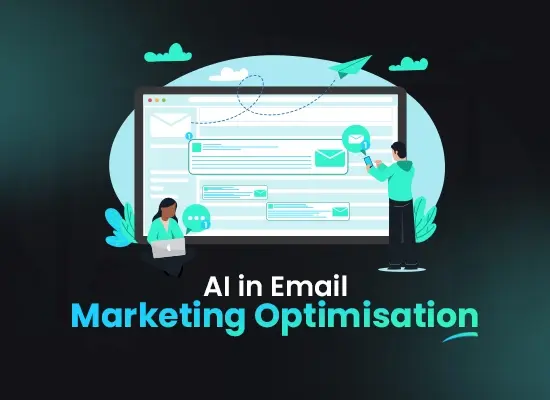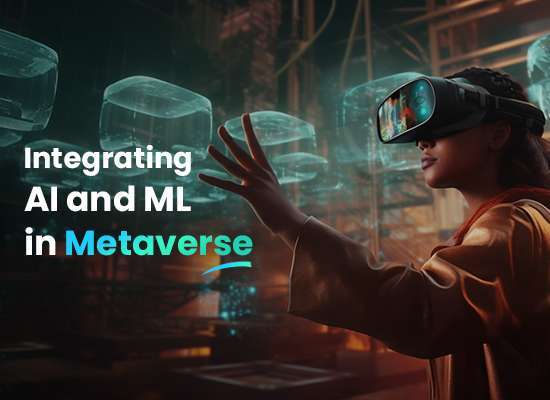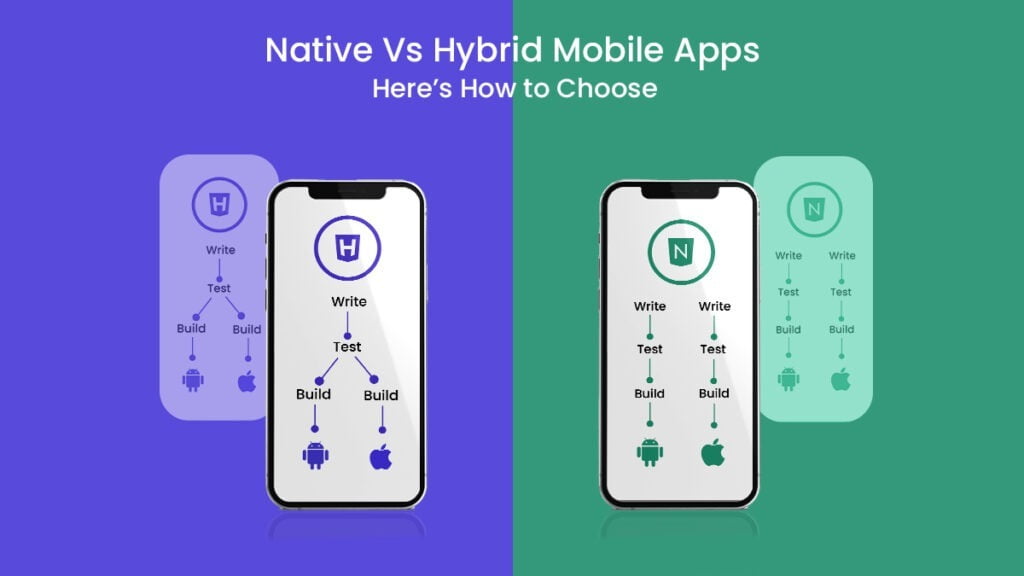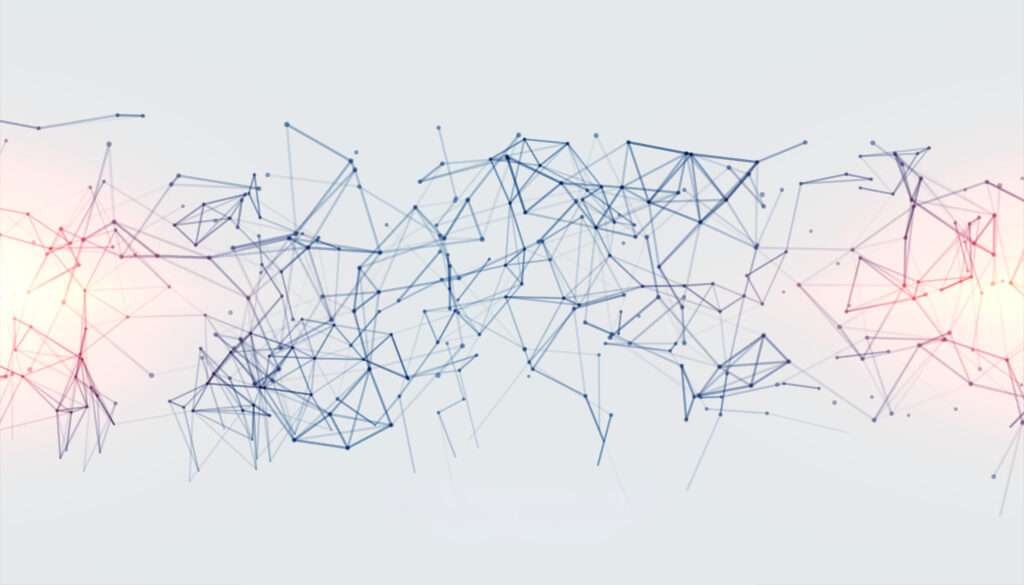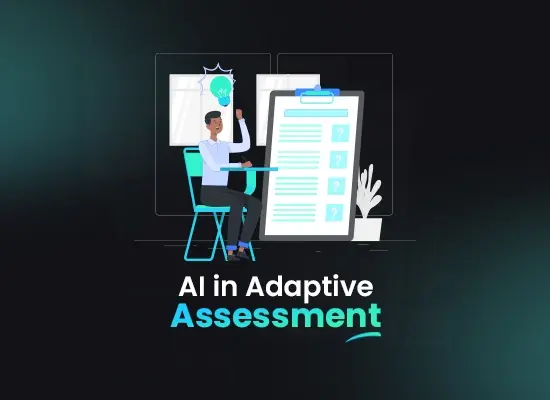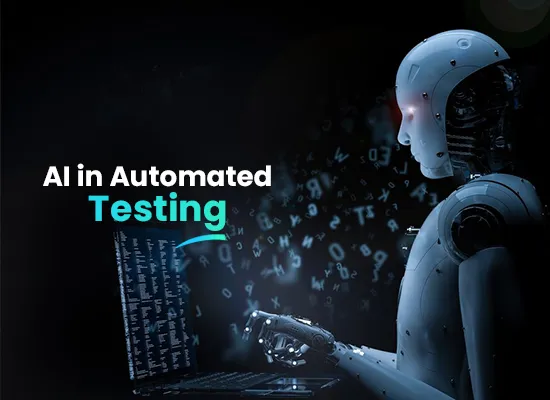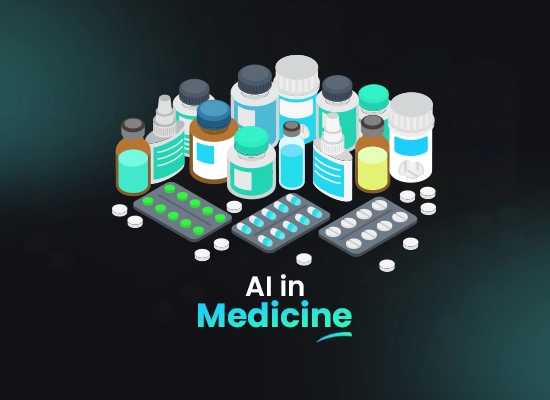
The medical field is on the cusp of a revolution driven by artificial intelligence (AI). This powerful technology holds immense promise for transforming healthcare delivery. In this exploration of “AI in Medicine – Empowering doctors, improving lives,” we’ll delve into the exciting ways AI is assisting medical professionals, ultimately leading to better diagnoses, more effective treatments, and improved patient outcomes.
What is AI in Medicine?
Artificial intelligence (AI) is rapidly transforming the medical field, ushering in an era of automated healthcare. AI in medicine encompasses various applications designed to improve efficiency, accuracy, and overall patient care.
Automated healthcare solutions powered by AI are making significant strides in areas like diagnostics and treatment planning. Data engineering services can analyse vast amounts of medical data, including patient records, imaging scans, and genetic information. This allows for faster and more accurate diagnoses, potentially leading to earlier interventions and improved patient outcomes.
Automated health systems are another exciting development. AI-powered systems can automate administrative tasks, freeing up healthcare professionals to focus on direct patient care. These systems can also automate tasks like appointment scheduling, medication reminders, and even basic health screenings.
The potential of AI in the medical field extends beyond diagnostics and automation. AI can be used for drug discovery, personalised medicine, and even robot-assisted surgery. As AI technology continues to evolve, we can expect even more groundbreaking applications that will revolutionise how we approach healthcare.
Seamless Collaboration | Cost-Efficient Solutions | Faster Time-to-Market

The Role of Artificial Intelligence in Healthcare:
Artificial intelligence (AI) is rapidly transforming the healthcare landscape. AI in the medical field is playing an increasingly crucial role in automating healthcare processes, improving diagnosis, and personalising treatment plans.
Automated healthcare solutions are emerging across various areas. AI algorithms can analyse medical images with exceptional accuracy, assisting doctors in early disease detection and improving diagnostic workflows. Automated health systems can analyse vast amounts of patient data to identify risk factors and predict potential health issues, enabling preventative measures.
Diagnostics are being explored for AI in medical field tasks like medication management and appointment scheduling. This frees up valuable time for medical professionals, allowing them to focus on complex cases and provide more personalised care to patients.
The potential of AI in healthcare is vast. As automated healthcare solutions continue to develop, we can expect even greater advancements in disease prevention, treatment efficacy, and overall patient well-being.
Applications of AI in Medical Imaging:
The field of medicine is witnessing a transformation driven by AI in the medical field. One of the most impactful areas is AI in diagnostic medical imaging. Here, AI algorithms are trained on vast datasets of medical images like X-rays, MRIs, and CT scans. This empowers them to analyse these images with exceptional precision and efficiency, paving the way for several groundbreaking applications:
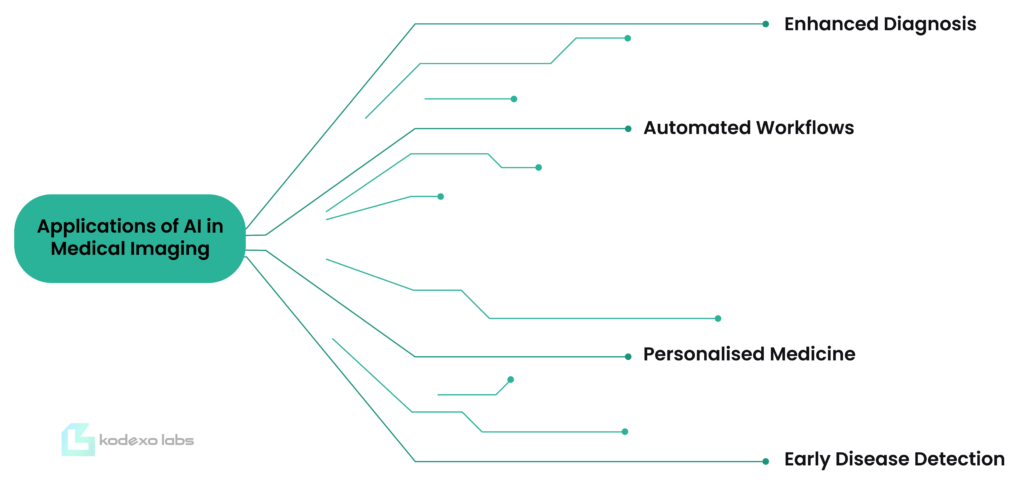
Enhanced Diagnosis:
AI can assist radiologists in identifying subtle abnormalities or patterns that might be missed by the human eye. This leads to earlier and more accurate diagnoses, improving patient outcomes.
Automated Workflows:
Tedious tasks like image segmentation and analysis can be automated by AI, freeing up valuable time for radiologists to focus on complex cases and patient interaction. This streamlines workflows and improves efficiency within AI in medical field.
Personalised Medicine:
AI can analyse medical images alongside a patient’s medical history to provide more personalised treatment plans. This allows doctors to tailor therapies based on individual needs, leading to more effective automated healthcare solutions
Early Disease Detection:
AI can detect early signs of diseases like cancer in mammograms or lung nodules in chest X-rays. Early detection is crucial for successful treatment, and AI can significantly improve the chances of catching diseases in their earliest stages.
Overall, AI in medical imaging is revolutionising healthcare by enabling faster, more accurate diagnoses, efficient workflows, and personalised medicine. This technology holds immense potential to improve patient outcomes and transform the future of AI in medicine.
Enhancing Diagnosis and Disease Detection with AI:
The rise of AI in the medical field is ushering in a new era of AI in medicine. Automated healthcare solutions powered by AI are transforming the way diseases are diagnosed and detected. Here’s how:
Image Analysis:
AI algorithms can analyse medical images like X-rays, MRIs, and CT scans with exceptional accuracy, assisting doctors in identifying abnormalities and potential diseases. This can lead to earlier diagnoses and improved treatment outcomes.
Pattern Recognition:
AI excels at recognising complex patterns in vast datasets of medical records. This allows automated health systems to identify subtle trends and risk factors that might escape the human eye, leading to a more personalised and preventative approach to healthcare.
Predictive Analytics:
AI can analyse patient data to predict the likelihood of developing certain diseases. This empowers doctors to take proactive measures, such as early intervention or preventative screenings.
AI in medical field, powered by AI, holds immense promise for revolutionising the medical field. By enhancing diagnosis, facilitating earlier disease detection, and enabling preventative measures, AI has the potential to improve patient outcomes and save lives.
Predictive Analytics and Automated Healthcare:
The healthcare industry is undergoing a transformative shift driven by predictive analytics and AI in the medical field. These powerful tools are revolutionising how healthcare is managed, enabling a move from reactive to proactive care.
Predictive analytics leverages historical data and machine learning algorithms to identify patterns and predict future health outcomes. This allows healthcare providers to anticipate potential health risks in patients, enabling them to intervene early and prevent complications.
Automated healthcare solutions powered by AI are streamlining processes and improving efficiency within healthcare systems. For example, AI can be used to analyse medical imaging data to detect diseases at an earlier stage or automate tasks like appointment scheduling and medication management.
The AI integration in the medical field with predictive analytics holds immense potential for personalised medicine. By analysing an individual’s medical history, genetic data, and lifestyle factors, AI can predict their susceptibility to certain diseases. This empowers healthcare providers to tailor preventive measures and treatment plans for each patient, leading to improved health outcomes and reduced healthcare costs.
Overall, predictive analytics and AI in the medical field are paving the way for a future of AI in medical field that is proactive, personalised, and data-driven. This collaboration is transforming healthcare management, leading to a healthier future for all.
Drug Discovery and Development with AI in Medical Field:
The traditional process of drug discovery and development is lengthy and expensive. However, the integration of Artificial Intelligence (AI) is revolutionising this field, paving the way for faster and more efficient solutions. AI in the medical field is playing a transformative role by automating various stages of drug development, leading to the emergence of automated healthcare solutions.
One key area of impact is automated drug discovery. AI and Machine learning development can analyse vast datasets of molecular structures and biological information to identify potential drug candidates with higher accuracy. This significantly reduces the time and resources required for traditional methods of drug screening.
AI in medical field systems is also being used to optimise drug development by predicting a drug’s efficacy and potential side effects. AI algorithms can analyse clinical trial data and patient information to identify patterns and trends, allowing researchers to make data-driven decisions and refine drug development strategies.
The use of AI in drug discovery and development holds immense promise for the future of medicine. By automating tasks, automated healthcare solutions powered by AI can accelerate the creation of new drugs, ultimately leading to faster and more effective treatments for patients. This signifies a significant step towards a more efficient and personalised approach to healthcare.
Personalised Medicine for Treatment Plans with Automated Healthcare:
Traditional medicine often employs a “one-size-fits-all” approach. However, the future lies in personalised medicine, a revolutionary field that tailors treatment plans to each individual’s unique needs. This exciting shift is powered by the transformative potential of AI in the medical field.
AI in medical field allows healthcare professionals to leverage vast amounts of patient data, including genetic information, medical history, and lifestyle factors. By analysing this data using sophisticated algorithms, AI can identify patterns and predict how a patient might respond to different treatments. This empowers doctors to create personalised treatment plans with a higher chance of success and fewer side effects.
Automated healthcare solutions built with Generative AI can analyse a patient’s medical records and suggest potential diagnoses or treatment options. This can significantly improve efficiency and accuracy in the diagnostic process. Automated health systems can even monitor a patient’s health in real-time, allowing for early intervention and preventive measures.
Personalised medicine with AI holds immense potential to transform healthcare. Imagine a future where AI in medical field systems provides patients with tailored treatment plans, leading to better health outcomes, reduced costs, and a more proactive approach to health management. This is the exciting future that personalized medicine powered by AI promises to deliver.
AI-Assisted Surgery and Robotics in Healthcare:
The world of healthcare is undergoing a significant transformation with the integration of artificial intelligence (AI) and robotics. This powerful combination is ushering in a new era of AI in medical field, offering numerous benefits for both surgeons and patients.
1- AI in Medical Field:
* Enhanced Precision:
AI algorithms can analyse medical images in real-time, providing surgeons with a clearer view of the surgical field. This improves precision and minimises the risk of errors during minimally invasive procedures.
* Improved Decision-Making:
AI can analyse vast amounts of patient data to suggest optimal surgical techniques and identify potential complications. This empowers surgeons to make data-driven decisions throughout the surgery.
2- Robotic Assistance for Surgeons:
Robotic arms offer superior dexterity compared to the human hand, allowing surgeons to perform complex procedures with greater control and minimal tremors. Minimally Invasive Surgeries use Robotic surgery to facilitate procedures, leading to faster recovery times, reduced pain, and improved cosmetic outcomes for patients.
3- The Future of Automated Health Systems:
The integration of AI and robotics in surgery represents just the beginning of automated healthcare solutions. As technology continues to evolve, we can expect further advancements in:
* Automated Surgical Planning:
AI will play a crucial role in pre-surgical planning, optimising surgical procedures for each individual patient.
* Remote Surgery:
AI-powered robotic systems hold the potential for remote surgery, allowing specialists to perform complex procedures regardless of geographical limitations.
4- Challenges and Considerations:
Despite the exciting possibilities, ethical considerations and practical challenges remain. Ensuring data security, addressing potential biases in AI algorithms, and establishing clear regulations for automated health systems are crucial areas of focus.
Overall, AI-assisted surgery and robotics represent a significant leap forward in healthcare, offering the potential for improved surgical outcomes, enhanced patient care, and a future filled with innovative automated healthcare solutions.
Remote Patient Monitoring and Telemedicine with AI:
The convergence of remote patient monitoring (RPM) and telemedicine with artificial intelligence (AI) is ushering in a new era of AI in medical field. This powerful combination allows for continuous patient monitoring, timely interventions, and personalised care, all from the comfort of a patient’s home.
Automated healthcare solutions powered by RPM leverage wearable devices and sensors to collect vital health data such as heart rate, blood pressure, and blood sugar levels. This data is transmitted securely to healthcare providers, enabling them to remotely monitor a patient’s health status.
AI in the medical field plays a pivotal role in analysing the vast amount of data collected through RPM. AI algorithms can detect trends, anomalies, and potential health risks in real-time. This allows for automated health systems to send alerts to healthcare providers when necessary, prompting them to intervene early and prevent complications.
Telemedicine, another key component of this system, facilitates virtual consultations between patients and healthcare providers. Patients can connect with their doctors remotely through video conferencing, eliminating the need for frequent in-person visits. AI can further enhance telemedicine by automating tasks like appointment scheduling, medication reminders, and even basic symptom analysis, freeing up healthcare providers’ time to focus on complex cases.
This integrated approach of remote patient monitoring, telemedicine, and AI offers numerous benefits. It improves patient access to care, especially for those living in remote areas or with mobility limitations. It also empowers patients to take a more active role in managing their health. Ultimately, AI in medical field has the potential to transform healthcare delivery, leading to better patient outcomes and a more efficient healthcare system.
Natural Language Processing (NLP) in Healthcare: Improving Clinical Documentation and Communication
The rise of automated healthcare solutions is transforming how healthcare professional’s work. Natural Language Processing (NLP) is emerging as a powerful tool within this revolution, specifically in improving clinical documentation and communication.
NLP empowers AI in medical field systems to analyse and understand vast amounts of textual data within healthcare settings. This includes doctor’s notes, medical records, and even patient-provider communication. By analysing this data, NLP can unlock several benefits:
Enhanced Clinical Documentation:
NLP automates tasks like summarising patient encounters and generating reports, freeing up valuable time for doctors to focus on patient care. It can also ensure consistency and accuracy in documentation, reducing errors and improving the quality of automated health systems.
Improved Communication & Collaboration:
NLP facilitates communication between doctors and other healthcare providers. It can translate medical jargon into simpler terms, enabling better understanding and collaboration between specialists. Additionally, NLP can analyse patient feedback and identify potential communication gaps, allowing for more patient-centred care.
Automated Risk Identification:
NLP can analyse medical records to identify potential risks and complications. By recognising patterns and trends in language, NLP can flag patients at risk of certain conditions or medication interactions, enabling early intervention and improved patient outcomes.
The integration of NLP in healthcare is still evolving, but its potential to streamline workflows, improve communication, and ultimately enhance patient care is undeniable. As AI in the medical field continues to advance, NLP will undoubtedly play a vital role in shaping the future of AI in medical field.
AI and Electronic Health Records (EHR) for Enhancing Data Management and Accessibility:
The healthcare industry is witnessing a transformative era with the convergence of Artificial Intelligence (AI) and Electronic Health Records (EHRs). EHRs, once static repositories of patient data, are now evolving into dynamic platforms empowered by generative AI in healthcare for predictions. This powerful combination unlocks a new level of data management and accessibility, ultimately improving patient care.
Unlocking Hidden Potential:
Traditionally, vast amounts of valuable data within EHRs remained largely untapped. AI algorithms can analyse these records, identifying patterns and trends that are invisible to the human eye. This empowers healthcare professionals to make more informed diagnoses and treatment decisions, personalised to each patient’s unique medical history.
Enhanced Efficiency and Accuracy:
AI automates tedious tasks like data entry and record retrieval, freeing up valuable time for clinicians. Additionally, AI can identify inconsistencies or missing information within EHRs, promoting data accuracy and completeness – a crucial factor for reliable medical decision-making.
Predictive Power for Better Outcomes:
AI goes beyond analysing past data. It can predict potential health risks or disease progression based on a patient’s medical history and other relevant factors. This enables proactive interventions, preventing complications and improving overall patient outcomes.
Personalised Care:
AI can generate personalised reports and recommendations based on a patient’s specific needs. This empowers patients to take a more active role in their health management, fostering better communication and collaboration between patients and healthcare providers.
Challenges and the Road Ahead:
While AI in EHRs offers immense potential, challenges remain. Data privacy and security are paramount. Additionally, ensuring fairness and mitigating potential biases within AI algorithms require ongoing development and ethical considerations. However, with careful implementation and ongoing research, AI presents a groundbreaking opportunity to revolutionise healthcare data management and unlock a new era of personalised and preventative care.
Seamless Collaboration | Cost-Efficient Solutions | Faster Time-to-Market

Future Directions and Innovations in AI in Medicine:
AI is rapidly transforming the healthcare landscape, ushering in a new era of personalised medicine, early disease detection, and streamlined healthcare delivery. Here’s a glimpse into some exciting future directions and innovations in AI-driven medicine:
Enhanced Diagnostics and Precision Medicine:
AI algorithms will become even more adept at analysing medical images, like X-rays and MRIs, enabling earlier and more accurate diagnoses. This, coupled with the analysis of a patient’s unique genetic makeup, will pave the way for truly personalised treatment plans tailored to each individual’s specific needs.
AI-Powered Drug Discovery and Development:
The traditional drug discovery process is slow and expensive. AI can revolutionise this field by analysing vast datasets of biological information and chemical compounds to identify potential drug targets and accelerate the development of life-saving medications.
AI-Driven Virtual Assistants and Chatbots:
AI-powered virtual assistants and AI chatbots will play a crucial role in preventative care and patient education. They can answer patients’ questions, provide medication reminders, and even offer mental health support, alleviating the burden on healthcare professionals
Robotics and AI in Surgery:
The future of surgery involves increased collaboration between human surgeons and AI-powered robotic assistants. These robots will enhance precision, minimise invasiveness, and potentially lead to faster recovery times for patients.
AI for Mental Health and Wellbeing:
AI is poised to play a significant role in mental health. AI-powered chatbots can offer initial screenings and support for individuals experiencing anxiety or depression. Additionally, AI algorithms can analyse facial expressions and speech patterns to identify potential mental health issues earlier.
These are just a few examples of how AI is transforming medicine. As AI technology continues to evolve and integrate seamlessly into healthcare systems, we can expect even more groundbreaking innovations in the years to come.
Conclusion:
AI in medicine is revolutionising healthcare by assisting with tasks like disease diagnosis, drug discovery, and personalised treatment plans. While not replacing doctors, AI tools analyse vast medical data to improve accuracy, efficiency, and ultimately patient outcomes, paving the way for a future of more precise and preventative healthcare.

Author Bio
Syed Ali Hasan Shah, a content writer at Kodexo Labs with knowledge of data science, cloud computing, AI, machine learning, and cyber security. In an effort to increase awareness of AI’s potential, his engrossing and educational content clarifies technical challenges for a variety of audiences, especially business owners.
